Daily
The Truth, Finally
An 8.4 Guardian story by John Crace advances the notion that The Expendables is Sex and the City for guys. Think about that. It’s generally accepted that the Sex and the City films were awful but women paid to see them anyway. So one could conclude that Grace is saying that The Expendables more or less sucks, but that won’t deter the guys. Is that a selling point?
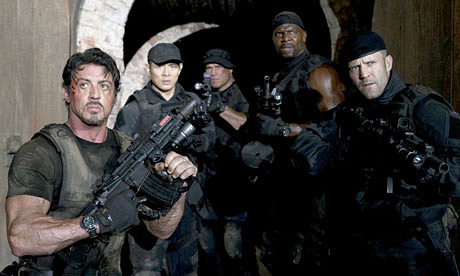
It has to be said that the dopey (and sometimes hilarious) splatter-gore spills that sold Stallone’s last Rambo film don’t pay off as well in The Expendables. Too much time and effort is spent on character embroidery and smart-ass macho camaraderie. It’s fun to see bad guys get blown apart (and for the most part they have no chance against “the boys,” and that feels good on some level). It’s mainly about the good guys just barrelling on through like it’s no one’s business — i.e., the Sex and the City cheer-on stuff — but The Expendables needs to be more than just a show for the home team.
A quality action movie always reaches out to skeptics and fence-sitters. Win that group over and your movie is home free. But director and co-writer Stallone doesn’t even try for this kind of approval. He seems content to operate from his safety zone, and to me that spells lazy-ass. Hell, it is lazy. Would that this film had been assembled by high-grade, top-talent people. I would have been down with The Expendables if it had been a ’90s Jerry Bruckheimer steak dinner. But it’s not — it’s tacos and cheese with chips.
Variety‘s Peter DeBruge said today that The Expendables is “a nearly incoherent all-stars-on-deck actioner that plays like Grown Ups on nitro or a brutish, blue-collar Ocean’s Eleven. The muddled execution falls far short of the talent involved” and “plausibility [doesn’t] seem to have been much of a concern. Basically, the plot serves to support the action sequences” although “the editors [haven’t] assembled the action footage footage in such a way that we can tell where characters are in relation to one another or what’s going on. [The film is] not so indispensable.”
Roadshow
The Alamo Draft House’s Rolling Road Show begins on 8.6 in Los Angeles with a screening of Jackie Brown, and concludes on 8.27 in New York City with a screening of The Godfather, Part II on — get this — “a Manhattan rooftop near Little Italy.” A week earlier (8.20) On The Waterfront will be shown on Hoboken’s Pier a Park. Thing is, there’s almost nothing left of the Hoboken that Elia Kazan shot in 1953 — it’s mostly been torn down, paved over and Starbucked. Even the echoes have disappeared. Or at least the meatheads have.

Art of Sitting Down
I don’t like guys who fall into their movie theatre seats like children. A guy did this in front of me a couple of nights ago. He just flopped backwards, his massive bulk collapsing into his rocking-chair seat and causing the hard-plastic backing to slam me in the knees. “Jerk!,” I muttered to myself. An elegant man always eases himself down onto the seat and gently leans back on his seat. If there’d been a scene in To Catch a Thief in which Cary Grant took Grace Kelly to a movie. you can bet he wouldn’t have pointed to two empty theatre chairs and said to Kelly, “Oh, look…watch me!” and then turned around and back-flopped into his chair like a kid splashing back-first into a pool.
Orange Doesn’t Work
Some kind of orange fetish has recently caught on among movie-poster designers. Last night in the 14th Street and 8th Avenue station I snapped a just-mounted one-sheet for Anton Corbijn‘s The American (Focus Features, 9.1). And then this morning Awards Daily posted an OMG Posters display of various Olly Moss one-sheet designs for several classic films. Was Moss hired by Focus Features to do an American poster, or is it just what it seems — a coincidence?
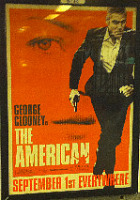
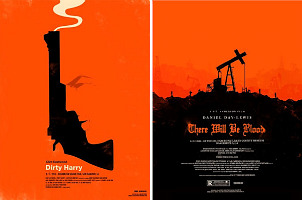
Orange has always seemed like an overly provocative color. Rude, obnoxious — doesn’t get along well with others. Splashy, splotchy. What’s orange good for besides napkins or kitschy ’50s furniture or summer dresses for older women? The fact that orange was Frank Sinatra‘s favorite color always made me think less of the guy. So I’m not a fan of orange-dominated movie posters. I never cared for that orange Vertigo poster from way back, and I’m not that intrigued by the American poster, and I think Moss’s posters for On The Waterfront and Rocky are kinda strange and what-the-fucky.
I understand that designers have to go where they want to go, etc., but let’s dump the orange at the first opportunity. Mustard…now there‘s a color!
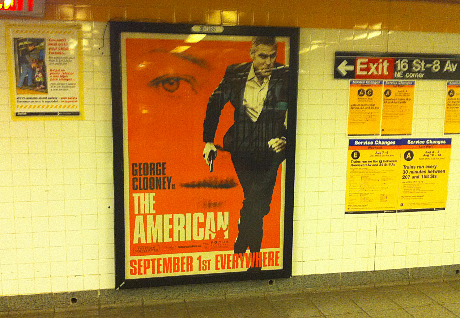
Edgar G. Ulmer’s Detour
A complete wifi modem meltdown in the Brooklyn apartment requires a hurried visit to Time Warner Cable’s offices on Paidge Avenue. This may or may not be followed by a 3:30 pm screening of Mesrine: Public Enemy #1 (i.e., the conclusion of Jean-Francois Richet‘s two-part French-produced crime thriller). The only good thing that has happened so far today is that Mike the building owner has fixed the front doorbell.
3-D Thrill is Gone
The Wrap‘s Daniel Frankel has reported data that shows moviegoers are becoming less and less interested in paying 3-D premium prices to see mezzo-mezzo 3-D fare. The cause of the situation is (a) “uneven” (underwhelming or flat-out shitty) quality from the films themselves, and (b) the ruinous effect of fake 3-D, which DreamWorks honcho Jeffrey Katzenberg ranted about four months ago.
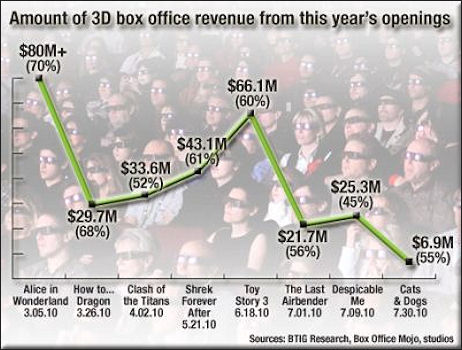
“Nearly 80 percent of Avatar‘s audience saw it in 3D…but 3D’s box-office trajectory has been pointing downward almost ever since,” Frankel writes. The obvious lesson is that if the 3D films that have opened since Avatar were (a) as good as Avatar and (b) delivered the same quality 3D, there probably wouldn’t be a drop in revenue worth reporting about.
Things might have been different also if the fake 3-D used by Clash of the Titans hadn’t poisoned the audience’s attitude about 3-D technology. James Cameron built 3-D into a wow attraction, and Titans delivered the first degradation that gradually convinced audiences that 3D wasn’t necessarily worth the extra cost.
What is Frankel’s report really about? The fact only 45 % of Despicable Me‘s revenue came from 3D showings and Warner Bros.’s 3-D presentations of Cats and Dogs: The Revenge of Kitty Galore grossed only $6.9 million. I don’t know anyone who gave a damn about seeing either of these films, 3-D or flat.
What we need right now (but of course won’t get) is a Hitler/Downfall video with Bruno Ganz subbing for Katzenberg and raging at the greedies for diluting the 3-D brand in record time.
Wandering Eye
Tonight I saw a significant portion of George Gallo‘s Middle Men, an overly emphatic faux-Tarantino crime movie about a fair-minded, level-headed businessman (Luke Wilson) who gets caught up in a porn-related internet billing service in the ’90s. Anyway, there’s an extended walking-through-an-orgy sequence that didn’t make the final cut sitting on pornhub.com.
The sequence isn’t as good as Stanley Kubrick‘s in Eyes Wide Shut and it isn’t exactly Scorsese-ish either, but it’s not half bad.
Opening on 8.6 through Paramount Vantage, Middle Men is based on the ’90s experiences of producer Christopher Mallick. Gallo directed and co-wrote the exaggerated script with Andy Weiss. Costars include Giovanni Ribisi, Gabriel Macht and James Caan.
Best Lennon Ever?
Watch the first 15 minutes of Lennon Naked, a John Lennon biopic that aired on British TV six weeks ago, and you’ll understand right away that it kicks Nowhere Boy‘s ass, and that Christopher Eccleston‘s lead performance is, like, way better than Aaron Johnson‘s.
You can complain that Eccleston, 46, is way too old to be playing Lennon in his 20s, but his performance more than compensates.
“It’s a brilliant performance in a brilliant film,” exclaimed The Guardian‘s Sam Wollaston, “because what Eccleston does get spot-on is the spirit of Lennon, with all his complications, contradictions and demons.
“It’s certainly no whitewash. He’s cruel to everyone – Brian Epstein, Cynthia, little Julian, the rest of the band, everyone except Yoko. He’s bitter and troubled, yet also idealistic. Very funny too, full of acerbic putdowns. The press conferences, where he returns caustic one-liners with top spin at the assembled press, are fabulous.”
Another Guardian piece notes that Lennon Naked “was shot on a shoestring budget in 18 days.”
Warning: Late last night HE reader Richard Huffman urged me to “remove the video embed immediately. Clicking on it and watching that movie through Megavideo managed to install some bullshit malware called ‘antimalware doctor’ on my machine. Not your fault, but I’m dreading the next four hours of disinfecting. Right now I have like 15 pop ups all over my desktop…ugh. Megavideo is notorious for putting up videos of questionable legality and then delivering viruses and malware when you click on the various play and pause buttons.”
Don’t Tell Me
I had my reasons for not getting into last Friday’s conversation about Liam Neeson saying he’s no longer attached to play Abraham Lincoln because he’s gotten too old.
For one thing that’s bullshit. Lincoln was 56 when he was shot and Neeson is a trim and healthy-looking 58. On top of which Lincoln wasn’t exactly a vision of youth and vigor with his haggard features and scraggly beard so give me a break. Neeson could be 60 or 62 and still get away with playing him, easy.
The other thing, I suspect, is that Neeson said what he said because like me and many others, he’s had it up to here with Steven Spielberg‘s endless dilly-dallying on the Lincoln-Neeson bipic, which has gone on for three or four years now.
Spielberg is seemingly (a) afraid of anything too Amistad-y (i.e., political principle in a historical context), and (b) probably doesn’t want to suffer through the same kind of reputation-diminishing pans that greeted Amistad‘s release. Deep down he’s afraid of the expectations that would be attached to any Honest Abe film. I think we all sense that now.
So if you ask me Neeson saying he’s too old to play Lincoln was code, I suspect, for (a) “I can’t deal with this bearded little pussy any longer,” (b) “I have my pride” and (c) “he’s kept me in limbo long enough.”
No Attitude
I understand that Eat Pray Love (Columbia, 8.13) is for over-30 women and gay guys, for the most part. But speaking as a yellow-sneaker-wearing metrosexual film buff, I’d like to find a place for it in my head. I’m down with any woman-friendly film that at least tries to deliver the basic goods. Give me some reasonably rounded characters, believable motivations, smartly sculpted dialogue and a reasonably satisfying story, and I won’t squawk. Really.

On top of which I’m a sucker for beautiful footage of Rome, Naples, India and Indonesia. That is, as long as the cinematography doesn’t make me feel that these locales have been, in a manner of speaking, re-constituted according to the requirements of sumptous big-studio imagery. Beautiful places always seem cooler when they haven’t been lighted too carefully.
So I don’t have an attitude about this Ryan Murphy-directed film. I do have a blockage, yes, about Julia Roberts. I look at her and see a raging me-aholic, but then I’m a me-aholic myself so I should be able to get around this. I was fine with her in Ocean’s 12, especially during the Rome hotel scene when she was playing a character who was pretending to be herself. As long as she doesn’t do that cackling laughter thing, I’m cool.
My other attitude is that any film with Richard Jenkins, Javier Bardem and James Franco can’t be all that bad.
I’ve called around this morning and haven’t found anyone yet who’s seen it. The Eat Pray Love premiere and the press showings are happening next week, and I know it was recently shown to the junket crowd in Napa, and to Stephen Farber‘s film class last night.
All this said, I couldn’t help but laugh when I read the following comment on the IMDB chat board” “Watching Eat Pray Love [will be] exactly the same as having a testicle removed.”
Reptiles in Tall Grass
Jeffrey Ressner‘s Hollywood Reporter piece about Hollywood Republicans and their “Friends of Abe” organization was posted last night. It mentions an FoA soiree last June at “a sprawling horse ranch near the Ventura County line” that was attended by Republican Senate hopeful Carly Fiorina.
Ressner lists the usual roster of industry-linked righties — Kelsey Grammer, Gary Sinise, Dennis Miller, Jon Voight, Lee Greenwood, Andrew Breitbart, Desperate Housewives creator Marc Cherry. Whom we’ve all been hearing and reading about for years, right? What about the next generation of Hollywood Republicans? Are there any industry righties from among the under-35 set? A movement without young blood is no movement at all.
Ressner scours some political-donation sites and concludes that “it’s easier to figure out what side Angelina Jolie is on in Salt than to understand the political motivations of some studio chiefs.” Sony honcho Michael Lynton and DreamWorks animation chief Jeffrey Katzenberg are described in the piece as apparent political fence straddlers.
Big Hollywood‘s John Nolte tells Ressner than Friends of Abe members keep a low profile because they fear a “chilling effect” on showbiz careers. “There’s no blacklist in the classic sense…it’s more of a peer-pressure thing,” he explains.
